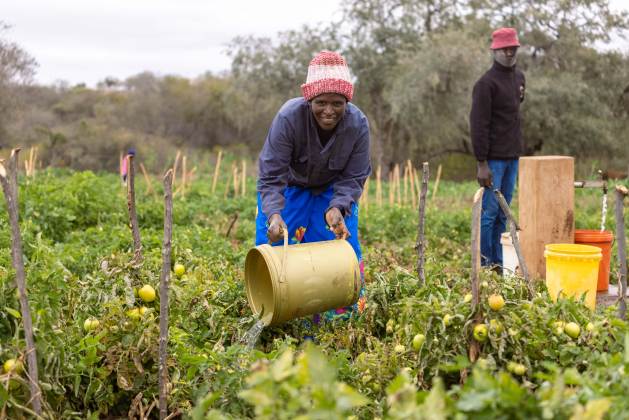Managing Water Sustainably Is Key To the Future of Food and Agriculture — Global Issues
PRETORIA, South Africa, Mar 15 (IPS) – In contrast to its strategic role as an essential resource to help achieve community development and poverty alleviation globally, groundwater has remained a poorly understood and managed resource.
This is according to a scoping study pertaining to the status of groundwater resources management in SADC. The study continues to say that over a staggering 40% of groundwater is used for global irrigation, this alone indicates the importance of this precious resource in navigating the population through impacts of climate change.
Groundwater has become indispensable particularly for agriculture production in many countries, and it is said that it accounts for half of South Asia’s irrigation and China where it supports two-thirds of grain crops produced.
Sustainable groundwater development for water and food security can never be over emphasized in mitigating against the worsening impacts of climate change. As surface water becomes more variable and uncertain, groundwater provides a crucial buffer for commercial and small holder farmers – who rely on groundwater to keep their crops green.
Therefore, it is imperative that sustainable and innovative strategies are developed to ensure sustainable supply of groundwater resource for improved livelihoods.
Groundwater responds to the water demands in a more flexible and reliable way, which allows farmers to increase their yields and mitigate effects of extreme water shortages. While water in general is a critical input for agricultural production and plays a significant role in food security, science reveals that Sub-Saharan Africa is not on track to reach the sustainable development goal on eradicating hunger.
The Synthesis Report on the State of Food and Nutrition Security and Vulnerability in Southern Africa 2022 says food and nutrition insecurity in the region continues to be unacceptably high and concerted efforts are required to build resilience to address the multiple and increasing shocks the region faces.
The report further asserts that the number of food insecure people is estimated to increase to 55.7million during the period 1 April 2022 to 31 March 2023 in the 12 Member States that provided data for the 2022 Regional Synthesis Report on Food Security, Nutrition and Vulnerability.
“More food needs to be produced to meet future demands due to population growth, lifestyle change and dietary changes and this calls for robust agricultural water solutions to sustainably manage water resources,” says Dr Manuel Magombeyi Regional Researcher at the International Water Management Institute.
Dr. Magombeyi further asserts that it is critical that people in general understand that as the food demand increases, so the water usage, and all these increases happen amidst climate change, therefore, thorough reconsideration of how water is managed in the agricultural sector, and how it can be repositioned in the broader context of overall water resources management and water security is critical.
Unfortunately, according to the United Nations Development Programme, at least 821 million people were estimated to be chronically under-nourished as of 2017, often as a direct consequence of environmental degradation, drought, and biodiversity loss.
Under-nourishment and severe food insecurity appear to be increasing in almost all regions of Africa. Several studies indicate that innovative Agricultural Water Solutions are urgently needed if we want to meet Sustainable Development Goal 2, Zero Hunger for everyone by 2030 as promulgated by the United Nations.
In the SADC region alone, at least 11 million people are facing critical food shortages due to drought caused by climate change. This situation calls for groundwater practitioners to think deeper and look for innovative solutions to support agricultural sector to improve food security.
According to Agricultural Water Management in Southern Africa Report, investments by both public and private sectors in Ag-water solutions represent an untapped opportunity. It is important that both sectors invest in Ag-water solutions to achieve the overall objective of poverty alleviation and broad-based agricultural growth. Most of these ag-water solutions have been implemented at a smaller scale. It is now important that they get upscaled for the benefits of larger communities, especially if the solution is working well.
The SADC Groundwater Management Institute has in the past years managed to help rural communities in some SADC Member States to ensure that they get access to water resources by tapping into groundwater resources available in respective countries.
Through the Sustainable Groundwater Management in SADC Member States project supported by the World Bank Group between 2016 and 2021, SADC-GMI managed to reach communities in Eswatini, Malawi, Mozambique, Zambia, Zimbabwe and assisted them to unlock groundwater resources for improved livelihoods.
Thokozani Dlamini is Communication and Knowledge Management Specialist for SADC Groundwater Management Institute
© Inter Press Service (2023) — All Rights ReservedOriginal source: Inter Press Service
Check out our Latest News and Follow us at Facebook
Original Source







